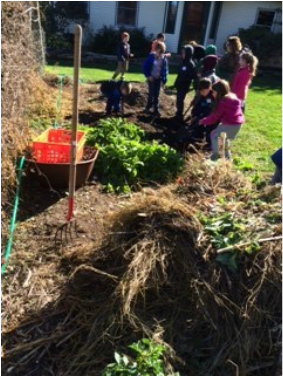Rhode Island Ceases Organic Farming Certification Program
By Rob Smith / ecoRI News staff
The state of Rhode Island is no longer double-checking
the labels on produce grown locally by organic farmers.
Earth Care Farm, Charlestown
In November, the state Department of Environmental Management officially ended its organic farming certification program, meaning the state is no longer accredited by the U.S. Department of Agriculture to ensure local produce meets federal standards to be classified as organic.
Local
farmers seeking organic certification will have to pay money out of pocket to
private companies to obtain certification. Rhode Island was the last state in
New England to still offer a certification program operated by a state government.
The reason for killing the program? DEM no longer has the
staffing or funding to maintain the certification program in line with federal
standards. Department spokesperson Evan LaCross told ecoRI News that, at
minimum, the USDA requires programs to have two full-time staff for
certification, and recommends three, due to the workload of certification.
“The most recent audit results said that although DEM did an excellent job with available resources, we simply don’t have sufficient resources to run a certification program,” LaCross said.
“DEM had to make the
difficult but realistic decision to voluntarily surrender our organic
accreditation before it was actively removed by USDA, but this doesn’t reflect
a change in priorities.”
LaCross noted DEM still provides grant funding to support
organic farms, and continues to administer the federal cost-sharing program,
which provides reimbursements from the USDA up to a certain percentage for
certification costs.
Only a small portion of Rhode Island farms are impacted by the end of the program. The USDA reported that Rhode Island had 1,054 farms as of the 2022 Agriculture Census. But according to the USDA’s Organic Integrity Database, only 46 Rhode Island farms are certified as organic operations.
Since DEM ended the program, only five farms have yet to
update their certification with a new private certifier. Thirty-two farms now
list the Massachusetts-based Baystate Organic Certifiers as their new
certifying agent for organic farming.
But the reality on the ground is, many farmers in Rhode
Island just don’t bother obtaining the certification, and many may use organic
practices — crop rotation, avoiding pesticides and other chemicals, and working
to improve the health of the soil — but lack the federal certification that
goes with it.
At a House Environment and Natural Resources hearing last
month, Greg Gerritt told lawmakers that farmers find the certification process
overly complicated and convoluted.
“None of the people I work with have ever gotten
certified for an organic farm,” Gerritt said. “There’s too many hoops to jump
through. Earth Care Farm [Charlestown] makes the best compost in the state, and
they have a large garden, and they’ve never been certified as organic because
the way the regulations are written there’s just way too much and way too many
hoops.”
Rep. Sherry Roberts, R-West Greenwich, introduced a bill
(H7563) earlier this
year that would restart DEM’s organic farming certification program and
allocate it an annual budget of $250,000 to provide grants, funding support,
and work with the state Department of Health to support food safety related
programs pertaining to local organic agriculture. The bill would also mandate
DEM designate one full-time employee to administer the program.
Roberts said at last month’s hearing that she wanted to
see DEM restart its certification program and take advantage of more federal
matching funds to grow organic farming within Rhode Island.
“I think we need to expand organic farming,” Roberts
said. “There’s not enough farms here in Rhode Island. Organic farming is one of
the fastest growing sections of U.S. agriculture.”
While lawmakers are supportive of boosting local organic
agriculture, others, like DEM and Gerritt, took issue with Roberts’ bill
including DOH in the process. DOH has no part in food safety and farm
regulations; per state law, those responsibilities lie within DEM’s Division of
Agriculture.
“If you’re going to pass this, make sure it stays within
DEM because the Division of Agriculture is the appropriate place for it,”
Gerritt told lawmakers. “It’s not the Department of Health, the Department of
Health has no expertise in agriculture at this point.”